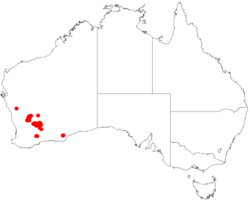Biology:Prostanthera semiteres
| Prostanthera semiteres | |
|---|---|
| Scientific classification | |
| Kingdom: | Plantae |
| Clade: | Tracheophytes |
| Clade: | Angiosperms |
| Clade: | Eudicots |
| Clade: | Asterids |
| Order: | Lamiales |
| Family: | Lamiaceae |
| Genus: | Prostanthera |
| Species: | P. semiteres
|
| Binomial name | |
| Prostanthera semiteres B.J.Conn[1]
| |

| |
| Occurrence data from AVH | |
Prostanthera semiteres is a species of flowering plant in the family Lamiaceae and is endemic to Western Australia. It is a small shrub with narrow egg-shaped leaves with the narrower end towards the base and pink or red flowers.
Description
Prostanthera semiteres is a shrub that typically grows to a height of up to 1.4 m (4 ft 7 in) and has hairless branches. The leaves are glabrous, narrow, oblong or egg-shaped with the narrower end towards the base, 2–12 mm (0.079–0.472 in) long, 0.5–1.2 mm (0.020–0.047 in) wide and sessile or on a short petiole. The flowers are borne singly in leaf axils on a pedicel 3–15 mm (0.12–0.59 in) long, the sepals 5–7.5 mm (0.20–0.30 in) long and forming a tube 4–6 mm (0.16–0.24 in) long with two lobes 0.5–2 mm (0.020–0.079 in) long and 3–5 mm (0.12–0.20 in) wide. The petals are pink or red, 16–25 mm (0.63–0.98 in) long and form a tube 6–14 mm (0.24–0.55 in) long. The lower lip of the petal tube has three lobes, the centre lobe egg-shaped, 2–3.5 mm (0.079–0.138 in) long and the side lobes 1–3 mm (0.039–0.118 in) long. The upper lip is 3–5 mm (0.12–0.20 in) long with a central notch up to 1.5 mm (0.059 in) deep.[2][3]
Taxonomy
Prostanthera semiteres was first formally described in 1984 by Barry Conn in the Journal of the Adelaide Botanic Gardens from specimens collected near Campion by Robert Chinnock in 1976.[2][4]
In the same journal, Conn described two subspecies and the names are accepted by the Australian Plant Census:
- Prostanthera semiteres subsp. intricata[5] that has leaves 2–6 mm (0.079–0.236 in) long and pedicels 7–15 mm (0.28–0.59 in) long;[2]
- Prostanthera semiteres subsp. semiteres[6] that has leaves mostly 9–11 mm (0.35–0.43 in) long and pedicels up to 5.5 mm (0.22 in) long.[2]
Distribution and habitat
This mintbush grows between granite rocks in the Avon Wheatbelt, Coolgardie and Mallee biogeographic regions of Western Australia.[2][3]
Conservation status
Both subspecies of P. semiteres are classified as "not threatened" by the Government of Western Australia Department of Parks and Wildlife.[7][8]
References
- ↑ "Prostanthera semiteres". Australian Plant Census. https://biodiversity.org.au/nsl/services/apc-format/display/111215.
- ↑ 2.0 2.1 2.2 2.3 2.4 Conn, Barry J. (1984). "A taxonomic revision of Prostanthera Labill. Section Klanderia (F.v.Muell.) Benth. (Labiatae).". Journal of the Adelaide Botanic Gardens 6 (3): 319–322. https://data.environment.sa.gov.au/Content/Publications/JABG06P207_Conn.pdf. Retrieved 28 September 2020.
- ↑ 3.0 3.1 "Prostanthera semiteres". FloraBase. Western Australian Government Department of Parks and Wildlife. https://florabase.dpaw.wa.gov.au/browse/profile/6923.
- ↑ "Prostanthera semiteres". APNI. https://id.biodiversity.org.au/instance/apni/543669.
- ↑ "Prostanthera semiteres subsp. intricata". Australian Plant Census. https://biodiversity.org.au/nsl/services/apc-format/display/111220.
- ↑ "Prostanthera semiteres subsp. semiteres". Australian Plant Census. https://biodiversity.org.au/nsl/services/apc-format/display/111223.
- ↑ "Prostanthera semiteres subsp. intricata". FloraBase. Western Australian Government Department of Parks and Wildlife. https://florabase.dpaw.wa.gov.au/browse/profile/11986.
- ↑ "Prostanthera semiteres subsp. semiteres". FloraBase. Western Australian Government Department of Parks and Wildlife. https://florabase.dpaw.wa.gov.au/browse/profile/12120.
Wikidata ☰ Q15355185 entry
 |

